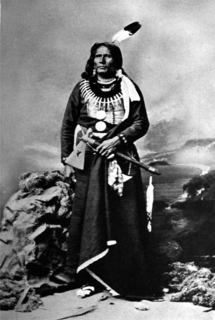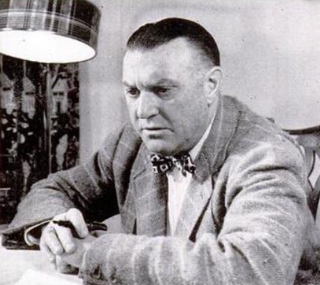A Quote by African Spir
The intellectual development of man, far from having get men away from war, has, rather, on the contrary, bring them to a refinment always more perfected in the art of killing. They even came to raise the methods of slaughter to the rank of "science"... We would not (On ne saurait", Fr.) imagine a more extraordinary moral blindness!
Related Quotes
The need for sociability induce man to be in touch with his fellow men. However, this need might not ("ne saurait", Fr.) find its full (or complete) satisfaction in the conventional (or superficial, - "conventionnel", Fr.) and deceitful world, in which (or where) everyone is mainly (or mostly) trying to assert oneself in front of others ("devant les autres", Fr.), to appear, and hoping to find in society ("mondaine", Fr.) relationships some advantages for his interest and vanity (or vainglory or conceit", Fr).
You have driven me from the East to this place, and I have been here two thousand years or more....My friends, if you took me away from this land it would be very hard for me. I wish to die in this land. I wish to be an old man here....I have not wished to give even a part of it to the Great Father. Though he would give me a million dollars or more I would not give to him this land....When people want to slaughter cattle they drive them along until they get them to a corral, and then they slaughter them. So it was with us....My children have been exterminated; my brother has been killed.
Moral certainty is always a sign of cultural inferiority. The more uncivilized the man, the surer he is that he knows precisely what is right and what is wrong. All human progress, even in morals, has been the work of men who have doubted the current moral values, not of men who have whooped them up and tried to enforce them. The truly civilized man is always skeptical and tolerant.
When men are engaged in war and conquest, the tools of science become as dangerous as a razor in the hands of a child of three. We must not condemn man because his inventiveness and patient conquest of the forces of nature are being exploited for false and destructive purposes. Rather, we should remember that the fate of mankind hinges entirely upon man’s moral development.
There are a sort of knight-errants in the world, who, quite contrary to those in romance, are perpetually seeking adventures to bring virgins into distress, and to ruin innocence. When men of rank and figure pass away their lives in these criminal pursuits and practices, they ought to consider that they render themselves more vile and despicable than any innocent man can be, whatever low station his fortune or birth have placed him in.
People who make war in order to escape slavery may possibly win....This will doubtless bring death and suffering to thousands....But people who tamely allow slavery to be imposed on them without resorting to a defensive war are inevitably doomed to years of death and suffering-and far more of each than any war would bring to them....The army doesn't exist that can annihilate men in their own land-not if they love it sufficiently.
In life we only try to produce, to win, and enjoy the more we can; in science, to discoverand invent the more we can; in religion, to dominate (or rule over) on the greatest number of people we can; whereas the forming of the character, the further development (or in-dept analysis, "appronfondissement", Fr.) of the faculties of the intelligence ("les facultés de l'intelligence", Fr.), the refinement of the consciousness and of the heart, are considered incidental (or subordinate) things.
We do not need more material development, we need more spiritual development. We do not need more intellectual power, we need more moral power. We do not need more knowledge, we need more character. We do not need more government, we need more culture. We do not need more law, we need more religion. We do not need more of the things that are seen, we need more of the things that are unseen. It is on that side of life that it is desirable to put the emphasis at the present time. If that side be strengthened, the other side will take care of itself.
I think every individual, and every society, is perfected just in proportion to the combination, and cooperation, of masculine and feminine elements of character. He is the most perfect man who is affectionate as well as intellectual; and she is the most perfect woman who is intellectual as well as affectionate. Every art and science becomes more interesting, viewed both from the masculine and feminine points of view.
The objections to religion are of two sorts - intellectual and moral. The intellectual objection is that there is no reason to suppose any religion true; the moral objection is that religious precepts date from a time when men were more cruel than they are and therefore tend to perpetuate inhumanities which the moral conscience of the age would otherwise outgrow.
The more gifted by nature is a man, the more is deplorable the abuse that he does by using them to shameful ends. A swindler (or crook) of higher condition is more blameworthy than a vulgar scoundrel; an intelligent eveil-doer, having benefited from a higher education, represent a more saddening phenomenon ("phénomène", Fr.) than an unfortune illiterate fellow having commited an offence.
During the Second War, the U.S.O. sent special issues of the principal American magazines to the Armed Forces, with the ads omitted. The men insisted on having the ads back again. Naturally. The ads are by far the best part of any magazine or newspaper. More pains and thought, more wit and art go into the making of an ad than into any prose feature of press or magazine. Ads are news. What is wrong with them is that they are always good news.
As a man of pleasure, by a vain attempt to be more happy than any man can be, is often more miserable than most men are, so the sceptic, in a vain attempt to be wise beyond what is permitted to man, plunges into a darkness more deplorable, and a blindness more incurable than that of the common herd, whom he despises, and would fain instruct.





































